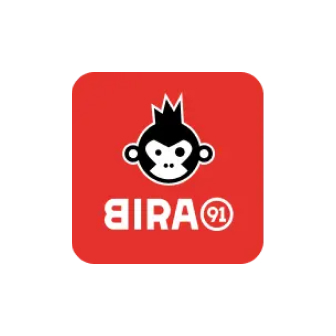
Established in 2015, Bira 91 has quickly become one of India's fastest-growing breweries. Funded by Sequoia Capital India, Sofina of Belgium, and Kirin Holding of Japan, Bira 91 operates two taprooms in Delhi NCR and two in Bengaluru, offering weekly experimental brews and a curry-shop menu
No annual reports available.
| Balance Sheet | FY23 | FY22 | FY21 | FY20 | FY19 |
|---|---|---|---|---|---|
| Share Capital | 19.0 | 14.2 | 13.27 | 44.3 | 39.8 |
| Reserves and Surplus | 142.8 | -237.0 | 101.3 | -82.8 | 75.0 |
| Total Equity | 161.9 | -222.8 | 114.6 | -38.5 | 114.8 |
| Long Term Borrowings | 17.4 | 155.8 | 137.4 | 89.5 | 56.0 |
| Other NC Liabilities | 303.2 | 272.5 | 282.5 | 224.3 | 2.5 |
| Total NC Liabilities | 320.6 | 428.3 | 419.9 | 313.8 | 58.5 |
| Short Term Borrowings | 297.2 | 190.9 | 110.0 | 76.64 | 32.46 |
| Other Current Liabilities | 494.5 | 333.7 | 276.8 | 202.2 | 76.6 |
| Total Current Liabilities | 791.7 | 524.6 | 386.8 | 278.84 | 109.06 |
| Total Equity & Liabilities | 1274.2 | 730.1 | 921.2 | 554.1 | 282.4 |
| Fixed Assets (incl. WIP) | 583.3 | 373.1 | 355.3 | 327.1 | 64.0 |
| Other Non Current Assets | 74.4 | 65.1 | 196.5 | 29.8 | 20.4 |
| Total NC Assets | 657.7 | 438.2 | 551.8 | 356.8 | 84.4 |
| Trade Receivables | 169.7 | 119.0 | 124.5 | 91.5 | 65.0 |
| Cash and Bank Balances | 196.1 | 51.3 | 76.8 | 43.1 | 46.3 |
| Other Current Assets | 250.7 | 121.5 | 168.1 | 62.8 | 86.6 |
| Total Current Assets | 616.4 | 291.8 | 369.4 | 197.4 | 197.9 |
| Total Assets | 1274.1 | 730.0 | 921.2 | 554.2 | 282.3 |
| Profit & Loss | FY23 | FY22 | FY21 | FY20 | FY19 |
|---|---|---|---|---|---|
| Net Revenue | 810.1 | 717.8 | 430.8 | 457.2 | 350.4 |
| Growth % | 12.87% | 66.63% | -5.78% | 30.49% | 0 |
| Operating Expenses 470.5 613.9 543.2 891.0 1022.4 | 1022.4 | 891.0 | 543.2 | 613.9 | 470.5 |
| Growth % | 14.75% | 64.02% | -11.51% | 30.49% | 0 |
| Operating Profit (EBITDA) | -212.2 | -173.2 | -112.4 | -156.7 | -120.1 |
| Operating profit Margin % | -26.20% | -24.13% | -26.10% | -34.27% | -34.28% |
| Other Income | 36.4 | 16.0 | 12.1 | 6.5 | 9.7 |
| Finance Costs | 95.9 | 87.7 | 76.2 | 49.9 | 19.4 |
| Depreciation and Amortization Expense | 119.8 | 90.1 | 75.0 | 57.2 | 5.3 |
| Profit before Tax | -391.5 | -335.1 | -251.5 | -257.3 | -135.0 |
| Tax | 117.9 | 0 | 0 | 0 | 0 |
| Tax % | -30.12% | 0 | 0 | 0 | 0 |
| Profit After Tax | -509.4 | -335.1 | -251.5 | -257.3 | -135.0 |
| Loss% | 52.03% | 33.20% | -2.25% | 90.58% | 0 |
| PAT % | -62.88% | -46.68% | -58.40% | -56.29% | -38.54% |
| Diluted EPS | -81.23 | -81.07 | 0 | -95.48 | 0 |
| Color | Shareholder | Holding |
|---|---|---|
| Mr. Ankur Jain | 24.43% | |
| Day1 Advisors Private Limited | 16.29% | |
| Mrs. Shashi Jain | 11.24% | |
| Sci Investments V | 8.39% | |
| Sequoia Capital India Investment IV | 4.44% | |
| Others | 35.21% |